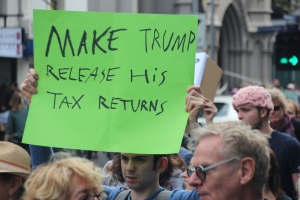By Sam Brunson
Speaking of the Freedom From Religion Foundation, last Thursday it filed suit challenging the constitutionality of section 6033(a)(3)(A) of the Code.
What does that first sentence mean? Broken down roughly: the tax law requires most entities exempt under section 501 to file an annual information return. That information return—currently Form 990—is filed with the IRS, but must also be made available to the public. It allows both the IRS and the general public a window into the financial workings of tax-exempt organizations, and provides a basis for administrative and public oversight of tax-exempt organizations. (For purposes of this lawsuit, it’s also worth noting that if a tax-exempt organization that is required to file a Form 990 doesn’t for three consecutive years, it automatically loses its exemption.)
Section 6033(a)(3)(A) provides a mandatory exception to the filing requirement, though. Under the Code, churches, their integrated auxiliaries, and conventions of churches don’t have to file a Form 990. While the IRS can still get access to them through an audit (though note that the steps the IRS must take to audit a church are really stringent), the general public has no way to see financial information about a U.S. church unless the church voluntarily discloses that information (which some do). Continue reading “NonBelief Relief and Form 990”


 By Sam Brunson
By Sam Brunson